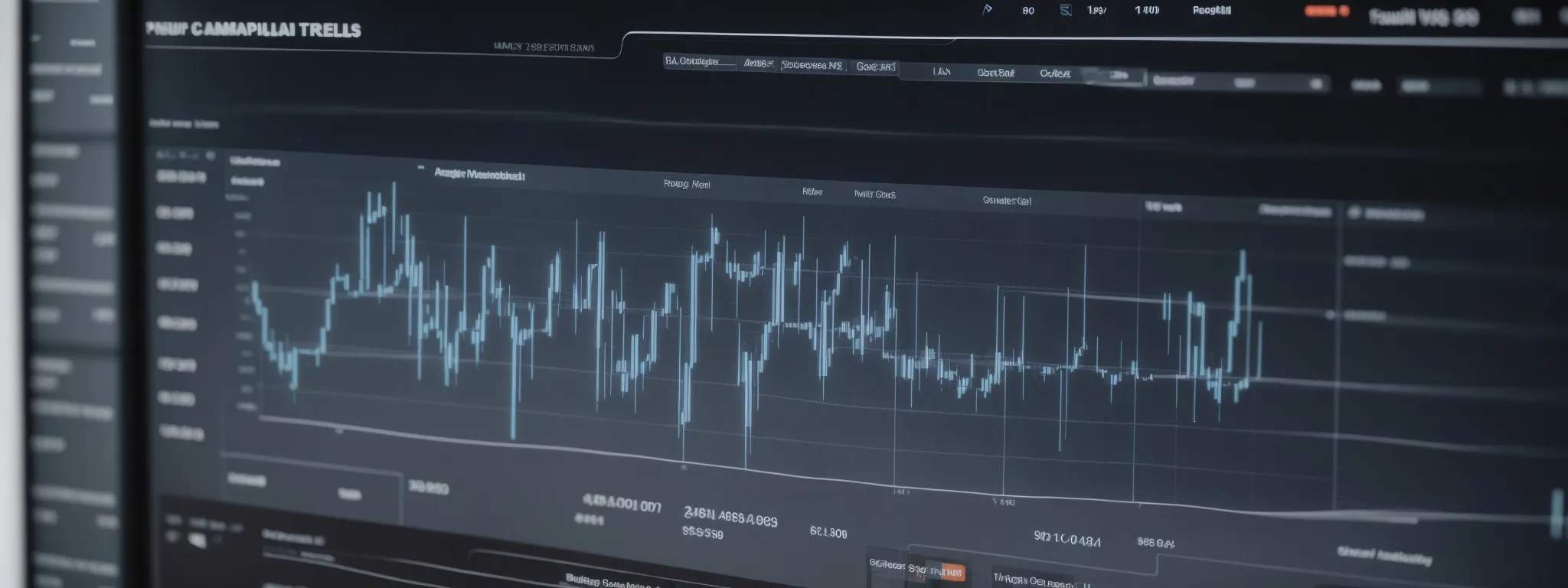Google Analytics Strategies to Measure SEO
Maximizing SEO Success With Effective Google Analytics Strategies Search Engine Optimization (SEO) has developed into a complex, data-driven discipline that requires a robust understanding of user behavior, […]
Maximizing SEO Success With Effective Google Analytics Strategies
Search Engine Optimization (SEO) has developed into a complex, data-driven discipline that requires a robust understanding of user behavior, site performance, and search traffic intricacies.
One indispensable tool in the arsenal of successful website owners and SEO consultants is Google Analytics, a platform capable of transforming raw data into actionable SEO strategies.
By integrating Google Analytics into their SEO efforts, businesses can dissect website traffic data, evaluate user engagement, and refine their online marketing approach.
LinkGraph’s SEO services leverage these insights, ensuring clients not only meet but exceed their digital marketing objectives.
Keep reading to discover how to harness Google Analytics for maximized SEO results and make every click count.
Key Takeaways
- LinkGraph Utilizes Google Analytics to Provide Actionable Insights and Data-Driven SEO Strategies
- Strategic Keyword Analysis Is Integral to Enhancing Content Strategy and Improving SEO Performance
- Understanding User Engagement Metrics Like Bounce Rates and Session Duration Is Crucial for Refining Content and SEO Tactics
- Goal Tracking and Conversion Analysis Within Google Analytics Are Key to Optimizing SEO Campaigns for Higher Conversion Rates
- Continuous Monitoring and Analyzing of SEO Efforts Help Quantify the Return on Investment and Guide Future Marketing Strategies
Setting the Stage for SEO Success With Google Analytics

Embarking on the journey to elevate search engine rankings necessitates a thorough understanding of the current performance landscape.
It begins with the methodical establishment of well-defined goals for SEO campaigns, which serve as the compass guiding all subsequent efforts.
Recognizing the pivotal role of baseline metrics provides a tangible measure of departure, ensuring progress can be meticulously tracked and key performance indicators can be benchmarked.
By seamlessly integrating Google Analytics into one’s SEO strategy, businesses unlock the capability to distill voluminous data into actionable insights, thereby reinforcing the foundation upon which search engine optimization fortifies its efficacy.
Establishing Clear Objectives for Your SEO Campaigns
In delineating the trajectory toward enhanced SEO outcomes, precise Goal-Setting Emerges as a cornerstone practice for digital marketers. Through the strategic articulation of goals—whether they revolve around augmenting organic search traffic, boosting keyword rankings, or amplifying user engagement—companies effectively chart the course for their SEO campaigns.
LinkGraph aids clients by meticulously aligning their SEO objectives with industry benchmarks, ensuring that the targets are not only ambitious but realistically attainable. This alignment propels website owners to hone in on a subset of critical seo metrics, such as conversion rates and session durations, which serve as pivotal guideposts for gauging the success of their search engine optimization endeavors.
Understanding the Importance of Baseline Metrics
In the realm of SEO, baseline metrics function as the critical benchmarks from which growth is measured and strategies are adapted. By establishing these foundational data points, LinkGraph’s experts empower clients with the clarity needed to scrutinize their search engine performance against quantifiable standards, tracing the path from current standings to desired SEO outcomes.
LinkGraph harnesses Google Analytics to capture a rich tapestry of user behavior, allowing for a nuanced understanding of how site visitors interact with various elements, from landing pages to social media referrals. This granularity of insight ensures that each decision made is informed by accurate reporting on website performance, user engagement, and myriad other key factors contributing to SEO efficacy.
Integrating Google Analytics With Your SEO Strategy
In the intricate dance of search engine optimization, Google Analytics operates as the rhythm section, syncing site performance to SEO strategies. The platform’s comprehensive SEO dashboard offers website owners a clear Panoramic View of their online visibility, from keyword ranking to backlinks, granting an all-encompassing perspective critical for making informed decisions that prop up SEO rankings.
For those under LinkGraph’s guidance, the integration of Google Analytics forms a pivotal segment of their SEO campaigns. By leveraging powerful analytic data and reporting views offered by Search Atlas, LinkGraph’s proprietary tool, clients derive a refined understanding of search traffic patterns, user engagement, and conversion rates, enabling them to sharpen their SEO tactics with precision.
Uncovering SEO Insights Through Google Analytics Reports

Uncovering pivotal SEO insights demands more than just a passive glance at analytics; it involves a deep analysis of myriad reports that reveal the intricate dance between audience behavior, acquisition channels, and organic search trends.
These reports serve as the linchpin in LinkGraph’s nuanced approach to optimizing a company’s search engine presence, taking them beyond mere data collection to a place where numbers transform into actionable strategies.
In this context, Google Analytics emerges not merely as a tool, but as an invaluable ally in dissecting the layers of SEO data to fine-tune efforts in audience engagement, acquistion influence, and evolving trends in search traffic, all of which are integral to the maturation of a robust SEO campaign.
Analyzing Audience Behavior to Inform SEO Efforts
Delving into Google Analytics for audience behavior analysis allows LinkGraph’s specialists to cross-correlate a wealth of seo data, mining insights into how users interact with a website. This analysis encompasses essential metrics such as page speed, session duration, and user engagement—a trifecta that can reveal the subtle nuances of visitor interactions and preferences.
By interpreting these metrics, LinkGraph crafts SEO strategies that resonate with the target audience. The synthesis of user behavior data enriches the understanding of how website visitors navigate through the sales funnel, providing the insight needed to optimize landing pages and strategically tailor content to bolster user experience:
- Examination of session duration and bounce rates uncovers areas requiring attention to increase onsite user retention
- Analysis of page speed surfaces actionable opportunities to reduce visitor drop-off and enhance overall site performance
- Inspection of conversion pathways helps refine the user journey for increased goal completions and maximized business outcomes
Armed with an intricate comprehension of user behavior, LinkGraph’s approach turns analytic observations into compelling SEO campaigns that drive quality traffic and foster higher conversion rates.
Tracking Acquisition Channels and Their Impact on SEO
Within the intricate web of search engine optimization, understanding the sources from which site visitors originate offers a distinct advantage. LinkGraph expertly tracks these acquisition channels through Google Analytics, providing clients with crucial insights into how search results, social media, referral traffic, and direct visits each contribute uniquely to website traffic dynamics and SEO performance.
Determining the impact of various channels allows businesses to allocate resources judiciously and align their marketing efforts with user preferences. With LinkGraph’s precision, companies can pinpoint which channels drive the highest quality of traffic and optimize their strategies for enhanced search engine visibility and increased user acquisition:
- Dissecting search traffic to enhance visibility for targeted google search terms.
- Profiling referral traffic for strategic partner engagement and content sharing.
- Optimizing direct visits by reinforcing brand recognition and loyalty initiatives.
- Amplifying social media marketing to foster community growth and drive engagement.
Evaluating Organic Search Traffic Trends Over Time
Grasping the shifts in organic search traffic over extended periods stands as a hallmark of LinkGraph’s analytical prowess, enabling clients to perceive patterns integral to refining SEO strategies. This long-term perspective highlights trends, seasonal fluctuations, and the ripple effects of past SEO activities on current search engine standings.
LinkGraph’s experts utilize Google Analytics to discern the endurance of SEO initiatives, offering a clear window into sustained performance or emerging opportunities for adjustment. Continuous scrutiny of organic traffic trends not only reinforces existing SEO tactics but also provides foresight for proactive measures in a constantly evolving digital landscape.
Mastering Google Analytics for Enhanced Keyword Analysis

Unlocking the full potential of search engine optimization involves more than just optimizing website elements—smart practitioners understand the critical importance of data-driven Keyword Analysis.
With Google Analytics acting as an instrumental part of LinkGraph’s SEO toolkit, the company leverages this powerful platform to identify high-performance keywords, optimize content strategies, and assess the impact of specific search terms on achieving SEO goals.
In this essential phase of SEO auditing, businesses use LinkGraph’s insights to align their SEO strategy with user search behavior, ensuring every piece of content is a stepping stone towards dominating search engine result pages.
Identifying High-Performance Keywords in Google Analytics
LinkGraph’s utilitarian approach to SEO leverages the potency of Google Analytics for identifying high-performing keywords, which are the bedrock of any SEO strategy. The agency’s analytical acumen facilitates the uncovering of search terms that deliver superior engagement, standing as markers for content optimization and strategic alignment.
Through the extraction of relevant seo data, LinkGraph allows clients to focus on keywords that are not only driving traffic but also contributing to goal completions, thereby refining their SEO tactics to target the most beneficial terms. This focused analysis ensures that efforts are directed towards optimizing for keywords that will most significantly enhance their visibility on search engine result pages.
Utilizing Keyword Insights to Optimize Content Strategy
Optimizing content strategy with keyword insights gleaned from Google Analytics propels LinkGraph’s SEO approach into the realm of precision marketing. By honing in on the terms that resonate with the user base, LinkGraph crafts content that not only elevates organic reach but also engages the audience at a granular level, driving both traffic and conversion.
Using these insights, LinkGraph delineates content themes and subjects that are aligned directly with the user’s search intent, thereby fulfilling the dual mandate of satisfying user queries and bolstering SEO effectiveness:
| SEO Metric | Insight Gained | Content Strategy Implications |
|---|---|---|
| High-Performance Keywords | Identification of most valuable search terms | Focus on creating targeted content around these search terms to drive relevant traffic |
| Keyword Conversion Rates | Which keywords lead to goal completions | Develop content that guides users towards conversion using these specific keywords |
| User Engagement with Content | Insight into how content impacts behavior | Adapt and refine content to improve metrics like session duration and pages per session |
Embedding strategic keywords into the core of each piece of content, LinkGraph ensures that the content not only draws in site visitors but also contributes to the overarching goal of enhanced SEO performance. The result is a content strategy that is not reactionary, but predictive and empowered by data-driven insights that directly impact search engine result rankings and user experience.
Assessing the Impact of Specific Keywords on SEO Goals
In the granular world of SEO, the power of specific keywords to drive goal achievements cannot be overstated. LinkGraph enables clients to dissect the influence each keyword exerts over SEO goals, isolating those that contribute most substantially to the desired outcomes such as conversions and engagement.
This tailored dissection by LinkGraph informs an adaptive SEO strategy focused on keyword efficacy relative to client-specific objectives:
- Methodical analysis of keyword-driven conversions equips businesses with the knowledge to enhance content for higher conversion impact.
- Rigorous evaluation of keyword relevance in relation to user queries and behaviors facilitates the refinement of SEO targets and priorities.
- Continual monitoring of keyword performance trends aids in the responsive adjustment of SEO tactics to maintain alignment with evolving market dynamics.
Ascertaining the impact of each keyword on the SEO landscape ensures that every aspect of the marketing strategy is purpose-built for success.
Leveraging User Engagement Metrics to Boost SEO

The intricacies of user engagement extend far beyond cursory metrics, delving into the depths of how visitors interact with a website and contribute to its search engine standing.
Professionals in the field employ a meticulous approach to interpreting bounce rates, analyzing session duration, and discerning pageviews, all of which provide a compass for content refinement and SEO enhancement.
LinkGraph’s dedication to optimizing these metrics through Google Analytics inspires a Strategic Overhaul that aligns SEO practices with the nuanced behaviors of a target audience, ensuring that every click and scroll on a website is a step towards higher SEO rankings and improved user retention.
Interpreting Bounce Rates for SEO Analysis
In the landscape of SEO, a website’s bounce rate offers a revealing glance into visitor behavior and site appeal. LinkGraph leverages this metric to analyze the immediacy with which users leave a page after a single interaction, a signal that potentially underpins issues such as page speed or content relevance, which, when addressed, can significantly improve SEO outcomes.
Reducing bounce rates goes hand in hand with enhancing the overall user experience, a factor that LinkGraph acknowledges as a contributor to SEO rankings. The firm interprets these rates, utilizing them to fine-tune landing page performance, ensuring content resonates with the target audience and fosters deeper engagement, thereby aiding companies in climbing the ranks of search engine result pages.
Examining Average Session Duration for User Retention Insights
Examination of average session duration provides LinkGraph with valuable user retention insights, identifying how long site visitors remain engaged with the content. This vital SEO metric paints a picture of audience interest and informs content adjustments geared toward longer interactions.
LinkGraph recognizes that extended session durations often correlate with higher engagement levels, signaling quality content and positive user experiences. By focusing on these metrics, LinkGraph strategizes to increase time spent on site, a direct contributor to improved SEO rankings:
| Engagement Metric | Significance | SEO Implication |
|---|---|---|
| Average Session Duration | Gauge of content engagement quality | Increased focus on content depth and relevance |
| Pages Per Session | Indicator of navigational ease and interest | Enhanced internal linking and topical breadth |
| Repeat Visits | Measure of brand loyalty and value | Content updates and retention strategies |
Using Pageviews and Unique Pageviews to Guide Content Creation
In the intricate process of content curation, LinkGraph strategically employs both pageviews and unique pageviews as described by Google Analytics to steer the content creation process. These metrics present a credible snapshot of the topics and formats that captivate audiences, guiding the development of future content to align with the preferences of website visitors and thereby elevating SEO potential.
Distinct pageviews illuminate the breadth of audience interest, allowing LinkGraph to discern the popularity and efficacy of specific pieces of content. The firm leverages these insights to shape a content strategy that capitalizes on trending topics, encourages deeper user interaction, and ultimately aims to solidify a robust presence on search engine result pages.
Enhancing on-Page SEO With Google Analytics Data

Within the realms of search engine optimization, on-page elements are pivotal in shaping a site’s relationship with search engines and users alike.
LinkGraph deftly utilizes Google Analytics data to refine these elements, ensuring they are as effective as possible.
By optimizing page titles and descriptions, scrutinizing page load times, and monitoring how users engage with content, businesses under LinkGraph’s tutelage enhance their on-page SEO, translating these data-driven adjustments into improved SEO performance.
It is through this rigorous analytics approach that a company’s on-page strategies are not just theoretically sound, but empirically validated, poised to capture and retain user attention in the competitive tableau of the digital space.
Optimizing Page Titles and Descriptions Based on User Behavior
LinkGraph’s skillful application of Google Analytics gives rise to enlightened Refinement in on-Page SEO Elements such as page titles and descriptions. This careful optimization ensures that the content presented meets the discerning criteria of both search engines and user behavior patterns.
Armed with Google Analytics insights, LinkGraph tailors page titles and meta descriptions to the language of the audience, directly influencing click-through rates (CTR) and engagement. Such meticulous adjustments to on-page metadata, informed by user interaction data, bolster a website’s relevance in search engine result pages:
| SEO Element | Focus Based on Analytics | Expected Outcome |
|---|---|---|
| Page Titles | Adapting language and terms that resonate with user searches | Increased CTR and improved SERP positioning |
| Meta Descriptions | Aligning with user-specific queries and intent | Enhanced visibility and user engagement |
Analyzing Page Load Time to Improve User Experience
In the quest to provide a superior user experience, analyzing page load time has emerged as a critical component for better SEO performance. LinkGraph recognizes that longer load times can deter user engagement, adversely affecting bounce rates and session durations, which are key metrics influencing Google’s ranking algorithms.
As a result, the organization employs the data from Google Analytics to shine a spotlight on page load time, initiating performance improvements that go a long way in enhancing the user experience. With an expedited load time, websites stand to gain improved user retention, which signals to search engines the quality and relevance of the content, further boosting SEO success:
- Page load time is scrutinized, leading to technical optimizations that speed up website responsiveness.
- User abandonment is reduced through improved site speed, capturing and sustaining visitor attention.
- Enhanced user experience fosters a positive perception of the brand, contributing to higher search rankings.
Monitoring Content Engagement for SEO Adjustments
To facilitate more informed SEO adjustments, LinkGraph places significant emphasis on the monitoring of content engagement. This vital analysis pinpoint areas where user interactions can be enhanced, driving refined tactics for content optimization that aligns with audience interest and behaviors.
A critical component of this process, Google Analytics offers unique insights into the ways individuals consume content, allowing LinkGraph to orchestrate SEO initiatives that resonate most effectively with their client’s target demographics. By delving into these interaction patterns, LinkGraph devises strategies that not only augment the user experience but also amplify the content’s potency in search engine rankings.
| Content Element | Engagement Metric | SEO Action |
|---|---|---|
| Blog Posts | Time on Page | Optimize post depth and relevance |
| Videos | Play Rate | Improve video quality and placement |
| Infographics | Shares and Saves | Increase visual appeal and informational value |
Refining Your SEO Strategy With Conversion Tracking

Success in search engine optimization is quantifiable when one effectively traces the conversion journey, a quest that remains central to LinkGraph’s data-driven methodology.
By harnessing Google Analytics’ robust conversion tracking capabilities, businesses can illuminate the pathway from initial visit to final conversion, acquiring insights essential to refining their SEO strategy.
Establishing precise goal tracking for SEO conversion analysis, unraveling the twists and turns in the conversion funnel, and calculating the return on investment from organic search efforts are indispensable steps toward optimizing search engine potency.
In embracing this analytical approach, companies can fine-tune their SEO campaigns, ensuring resources fuel the strategies yielding the highest dividends in attracting and converting their target audience.
Setting Up Goal Tracking for SEO Conversion Analysis
Accurate goal tracking for SEO conversion analysis stands as a fundamental aspect of LinkGraph’s strategy, facilitating the clear vision of how each user interaction contributes to overall success. Establishing such tracking within a Google Analytics account allows for the precise measurement of user activities, from session duration to the specific actions that lead to conversions.
With LinkGraph’s expert guidance, clients can discern pivotal transitions within the conversion process that define successful SEO outcomes:
- Identifying key conversion pages and setting up corresponding goals within Google Analytics.
- Utilizing goal conversion rates to gauge the effectiveness of landing pages and SEO efforts.
- Tracking assisted conversions to understand the full scope of how various channels contribute to final goal completions.
Through diligent goal configuration, LinkGraph ensures that each client not only observes the stepping stones leading to conversions but also gains insights for the optimization of future SEO strategies. This analytical rigor results in a more targeted approach, ultimately driving higher conversion rates and bolstering the return on investment for SEO activities.
Understanding the Path to Conversion Through Funnel Visualization
Funnel visualization in Google Analytics is elemental for businesses seeking to unravel the intricacies of user pathing from first contact to conversion. It provides visual clarity on how visitors navigate through the site, pinpointing drop-off points where potential customers disengage.
By scrutinizing each segment of the conversion funnel, companies under LinkGraph’s advisement can identify and address friction points, thus streamlining the user journey toward the ultimate goal completion:
- Funnel visualization highlights the progression from user acquisition to conversion, allowing for targeted optimization at every stage.
- Detailed analysis of each step reveals areas in need of refinement to enhance the flow and eliminate barriers that hinder conversion.
- Strategic adjustments are made based on this visualization, leading to improved user experience and increased conversion rates.
Measuring the ROI of Organic Search Efforts
In quantifying the return on investment for organic search efforts, LinkGraph meticulously analyzes the conversion attribution to ascertain which SEO tactics yield fiscal benefits. By evaluating the revenue generated through organic search traffic and contrasting it with the investment in SEO activities, businesses gain a comprehensive understanding of their profitability. This analytical discipline assists in strategizing where to allocate budgets for maximum impact on search engine rankings and overall online visibility.
LinkGraph’s proficiency with Google Analytics enables clients to trace the precise customer interactions that lead to sales, providing a clear picture of how organic search strategies contribute to the bottom line. Through diligent examination of this data, companies can judiciously refine their SEO endeavors, amplifying those aspects that demonstrably increase revenue and ensuring resources are invested in the most effective areas.
Conclusion
Maximizing SEO success hinges on employing effective Google Analytics strategies to capture and interpret vast data, guiding critical decisions and refining SEO tactics.
By setting clear campaign objectives and understanding baseline metrics, businesses can benchmark progress and tailor their approach.
Analyzing audience behavior and tracking acquisition channels through Google Analytics enables precision targeting and optimization of content strategies with keyword insights.
Additionally, leveraging user engagement metrics and enhancing on-page SEO elements informed by user interaction data directly impact rankings and user retention.
By mastering conversion tracking, businesses can monitor the effectiveness of their SEO strategies, optimizing the user journey and measuring the ROI of organic search efforts.
Ultimately, using Google Analytics empowers companies to boost SEO outcomes through data-driven decisions that enhance visibility, user experience, and convertibility.














































































